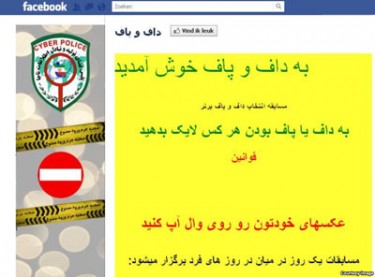In the latest examples creative repression over the internet, the Islamic regime has used Skype as a long-distance interrogation tool, and wrested control over a Facebook group for photos of hot guys and girls from its administrators.
Skype interrogation
In order to increase the pressure on one foreign-based Iranian journalist for the BBC, a relative in Iran was arbitrarily detained for nearly two weeks, and the journalist was interrogated over the internet on Skype video.
According to Human Rights Watch, the Iranian government has been intimidating and detaining relatives and friends of foreign-based Persian-language journalists to obtain information or silence them.
Iranian blogger Tahriyeh Khamoush writes [fa]:
… reading this story we can see what a monster the Islamic Republic has become. 40 minutes of interrogation via Skype while the journalist’s sister was jailed. The journalist was at her home in London while she was interrogated by revolutionary guards intelligence agents. The journalist only heard the voices in Iran while the interrogators could both see her and listen to her voice.
The journalist’s sister was released after the interrogation. She said she was forced to make false confessions broadcast on TV.
There are three jailed bloggers and journalists, Parastou Dokouhaki, Mazieh Rasouli and Sahmoldin Borghani who are under pressure to confess collaboration with BBC.
Attacking a Facebook group

Message by cyber police on what was formerly the 'Daaf & Paaf' Facebook page promoting a photo contest.
About a week ago a Facebook page called Daaf & Paaf (meaning “hot girl & hot boy”) came under the control of Iran's cyber police who announced [fa] on the group's Facebook “wall” that “the administrators of this group have confessed to promoting banality”.
The group promoted an online photo contest for hot Iranian men and women, and had around 27,000 fans [the content is not available anymore].
Cyber police reportedly arrested four men and women for administrating the Facebook page.
Faryadeazadi collected and republished [fa] several comments that users left on the Daaf & Paaf Facebook page after it came under control by Iranian security forces:
You beat the poor guys and got their passwords, and now you think you performed a masterpiece by controlling this page… Look at our cyber police, instead of running after criminals and thieves, it gets involved with this kind of story… Mark Zuckerbeg was involved too, go arrest him as well.
A long history
The Iranian regime not only represses bloggers and filters websites and blogs, but has many times used the internet creatively as a tool to increase pressure or spread fear.
In 2009, the regime employed crowd sourcing to target suspects when the protest movement erupted. Using widely disseminated online photos from post-election demonstrations, a website of the Islamic Revolutionary Guard Corps called Gerdab (which means ‘vortex’), encouraged people to submit information that could lead to the arrest of protesters.
We can add to this menu of creativity, the recent “Law of Computer Crimes” that make almost all ordinary users computer criminals.
Indeed, the internet is not only a gift for freedom lovers but also for repressive machines.



